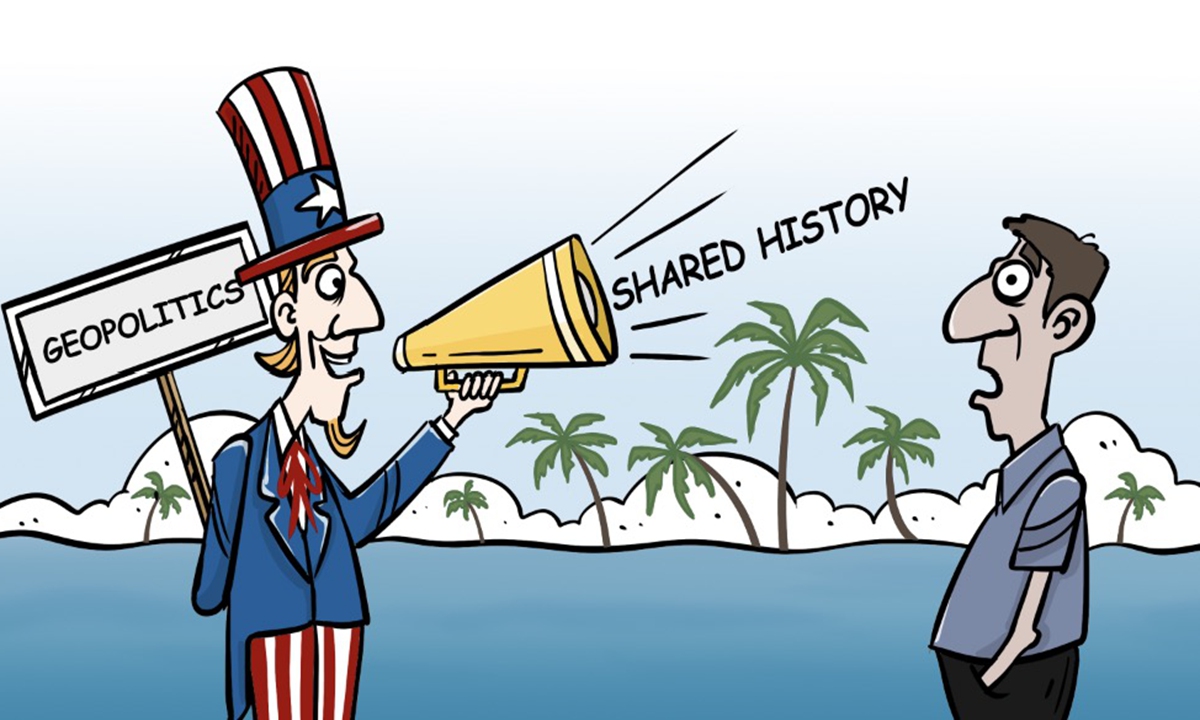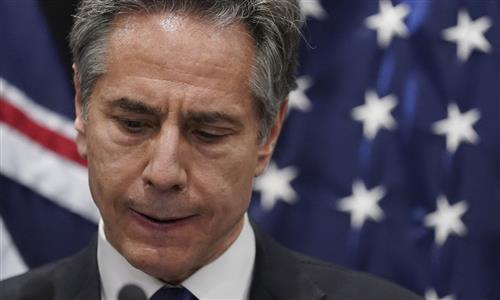US officials' tandem trip to Pacific "band-aid" diplomacy, exposes eagerness of strengthening ties in countering China

Illustration: Chen Xia/GT
US Secretary of State Antony Blinken and US Defense Secretary Lloyd Austin kicked off tandem trips to the South Pacific this week, a move seen by Chinese experts as Washington's eagerness to increase its presence in region. However, observers said the visits are no more than "band-aid" diplomacy which only exposes US' anxiety, but will not scuttle China's growing ties with regional countries.
The US State Department said Blinken's agenda includes visits to Tonga, New Zealand and Australia from Monday to Saturday. He will dedicate the US embassy in Tonga on Wednesday - a move many experts say is part of Washington's plan to counter China's growing influence in the Pacific.
In New Zealand, Blinken will hold important discussions on shared priorities with senior government partners, and will also cheer on the US Women's National Team at the FIFA Women's World Cup.
The US Secretary of State will conclude the trip in Brisbane from July 28 to 29 to attend the Australia-US Ministerial Consultations (AUSMIN) and hold bilateral meetings.
Meanwhile, US Secretary of Defense Lloyd Austin plans to become the first US defense secretary to visit the island state of Papua New Guinea this week, during his eighth visit to the Indo-Pacific.
He will join Blinken and Australian officials at AUSMIN, according to the US Department of Defense.
The main focus of Blinken and Austin's tandem trip is AUSMIN, where they will seek to pressure Canberra to stick to the US' Asia-Pacific strategy in order to counter China, especially when China's cooperation with Australia has recovered in recent months, Chen Hong, president of the Chinese Association of Australian Studies and director of the Australian Studies Center at East China Normal University, told the Global Times.
Putting Tonga, New Zealand and Papua New Guinea on the visiting list demonstrates US eagerness to step up efforts to vie for influence with China in the region, said Chen. He described US officials' visits as "band-aid" diplomacy. "The US has neglected this region for years. Now it is striving to court regional countries only after seeing their growing cooperation with China. Just like a band aid, plastered on where it hurts," said Chen.
In February, the US reopened its embassy in the Solomon Islands after a 30-year absence and is planning diplomatic missions in Vanuatu and Kiribati.
Observers said that Blinken and Austin's visits to South Pacific island countries are to secure upgraded military ties.
"Tonga is one of the only three countries in South Pacific region that has a standing militaries," said Chen Xiaochen, deputy director of the Institute of Area Studies at East China Normal University. He noted that Papua New Guinea also has a standing military. High-level US officials' visit to those countries reveal its intention to up the ante of military presence in the region.
However, Chinese observers predicted that US efforts to marshal regional countries may be in vain, as those countries are skeptical of US hypocritical gestures. The US and Australia have repeatedly criticized the security pact signed by China and the Solomon Islands in 2022.
After he concluded his visit to China this month, Prime Minister of the Solomon Islands Manasseh Sogavare accused the US and Australia of being "un-neighborly" by criticizing the security pact. "This is nothing but interference by foreign states into the internal affairs of Solomon Islands," Sogavare said.
Chen Hong believes US anxiety is growing after watching New Zealand, a country that is part of the Five Eyes, uphold an independent diplomacy and be willing to expand cooperation with China.
New Zealand Prime Minister Chris Hipkins visited China last month. During his visit, Hipkins said "the New Zealand-China relationship is an incredibly important one for New Zealand."
"The US' anxiety is fully exposed by its eagerness to send so many olive branches to the Pacific countries. On the other hand, their anxiety just proves how successful China's cooperation with those countries is," said Chen Hong.


